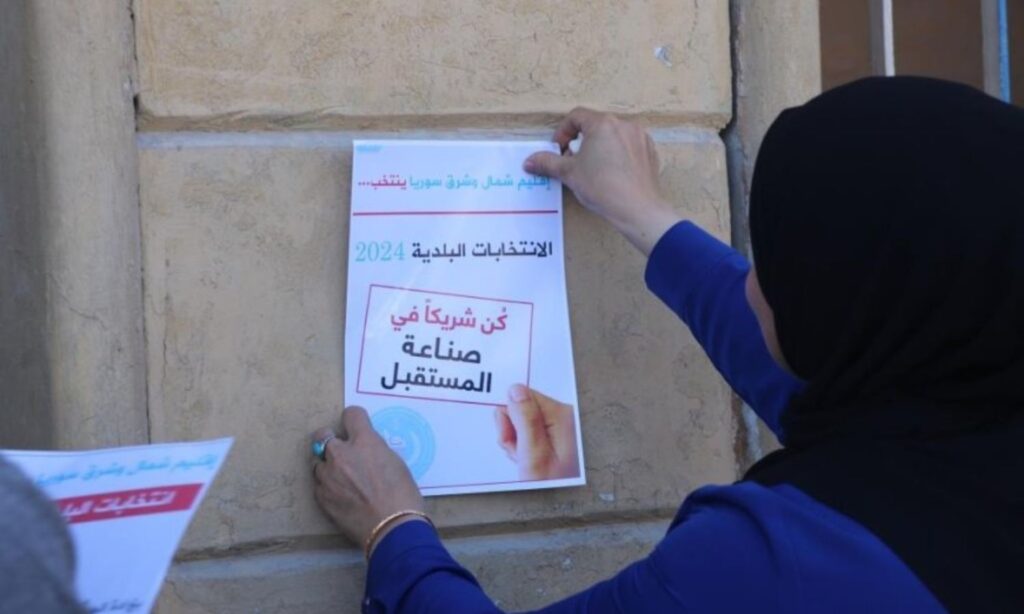The Autonomous Administration of North and East Syria (AANES) announced the commencement of preparations for conducting municipal elections in the areas under its control, more than four months after postponing them for the first time.
AANES issued decision No. 7 today, Thursday, September 5, stating that it had delegated its High Election Commission to start working on conducting the municipal elections.
The decision did not specify a date for the elections but indicated that they would be held at a time deemed suitable by the High Election Commission, according to the situation in each canton separately.
AANES administratively divides the areas under its control into cantons, ignoring the original administrative division of the Syrian governorates in the region.
The municipal elections had previously been postponed three times: the first at the end of May, the second in June, after which the President of the Democratic Union Party (PYD), Salih Muslim, spoke about AANES’ insistence on holding elections in August.
AANES did not announce a third postponement of its elections, although it surpassed the previously announced timeframe. There were, however, leaks, sources, and media reports suggesting that the elections would be postponed again.
On July 25, North Press Agency quoted the Secretary of the Kurdish Democratic Party in Syria (Al-Parti), Nasreddin Ibrahim, saying that political parties would submit a request to postpone the elections “until appropriate conditions are prepared.”
On August 20, the Secretary of one of the Kurdish parties that participated in a meeting with AANES told the Kurdish Rudaw network (based in Erbil), “We discussed the matter with the Autonomous Administration. We believe that these elections should not be held at present. There is no need to set any date for the elections at all.”
Pressures leading to postponement
Days after the first postponement of the elections, the United States (the main supporter of AANES) commented, stating that the “crisis” conditions in Syria are not conducive to holding elections in northeastern Syria at the present time.
In a press briefing by the Principal Deputy Spokesperson for the US Department of State, Vedant Patel, on May 30, the United States maintained its position that any elections held in Syria “must be free, fair, transparent, and inclusive.”
With the second postponement, Germany took the same stance through its Special Envoy to Syria, Stefan Schneck, who said via the X platform that holding elections in Syria at present would not advance the political process but would rather entrench the long-standing conflict and division.
Ankara took a more severe stance, with the leader of the Turkish Nationalist Movement Party (MHP), Devlet Bahçeli, calling for a joint military operation combining Turkey and the Syrian regime to eliminate the Kurdistan Workers’ Party (PKK) in Syria, according to the Turkish newspaper Cumhuriyet.
Bahçeli criticized the municipal elections, considering them a new phase of “dividing Turkey,” noting that the United States sees dialogue with the “terrorists” as of strategic importance in the area, referring to the Autonomous Administration.
AANES denies being under pressure
While the election postponement coincided with US-European disengagement and sharp Turkish statements, the Autonomous Administration denied that the elections were postponed due to political pressure or Turkish threats.
The co-chair of the External Relations Directorate in the Autonomous Administration, Ilham Ahmed, said on June 13 that the municipal elections were a “restoration process for service institutions aimed at rehabilitating what the Turkish state has destroyed in the face of international silence.”
Ahmed added that the electoral process was a popular demand that emerged as one of the outcomes of the Conference of the Sons of al-Jazira and the Euphrates held in 2019 after consultative meetings with the region’s inhabitants. However, the elections were postponed due to security reasons.
According to Ahmed, the Autonomous Administration was surprised by the negative responses from many international parties regarding this step, which was stipulated by the UN Resolution 2254 related to Syria.
Ankara considers the Syrian Democratic Forces (SDF), the military wing of the Autonomous Administration, as an extension of the PKK, which is listed as a “terrorist organization” in Turkey. The SDF denies this, despite previously admitting to having PKK fighters in its ranks.

